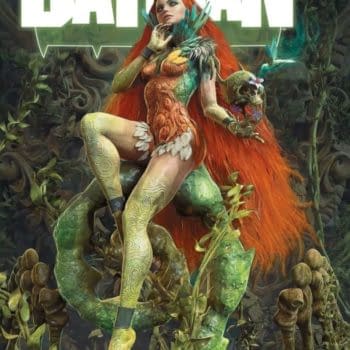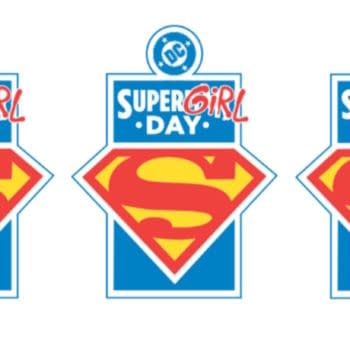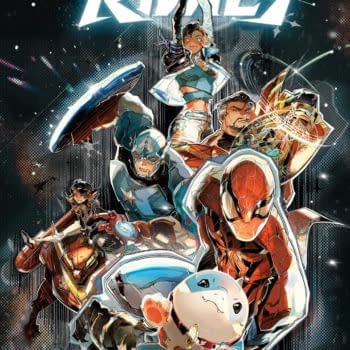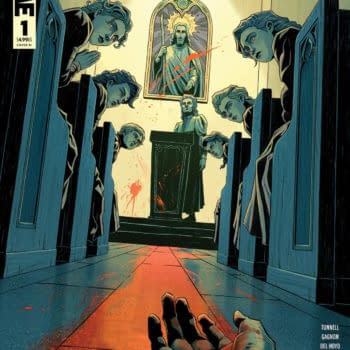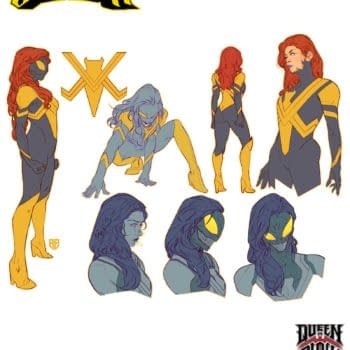Posted in: Comics, Recent Updates | Tagged: Comics, dc, dc comics, entertainment, ethnicity, gender, gendercrunching, image comics, marvel, Marvel Comics, women in comics
Gendercrunching June 2015 – Plus Ethnicity At DC, Marvel, And Image
By Tim Hanley
DC's overall percentage of female creators declined by more than half coming out of Convergence while Marvel ticked up and took the top spot with all of their Secret Wars tie-ins. We also take a look at ethnicity at DC, Marvel, and Image and see some small but moderately encouraging changes.
DC COMICS
Convergence was big for female creators at DC, largely due to huge editorial numbers. With things back to a regular schedule with the new #DCYou initiative, the numbers fell significantly. In June 2015, DC released 68 new comics with 573 credited creators, 503 men and 70 women. Here are their stats:
Compared to May, DC fell 13.1%, a drop that's bigger than their overall percentage for most months. But Convergence was an oddity for DC, so let's compare the June numbers to March 2015, DC's last regularly scheduled month. DC's up 0.1% since then, an insignificant change, but things have shifted across the board. Writers, pencillers, inkers, and editors all jumped 2 or 3 percentage points, while letterers fell 4 points, colorists were down 7, and assistant editors tumbled 12 points. Despite some big losses, the numbers worked out to a slight positive growth. Nonetheless, June was supposed to be a month of bold new directions for DC that showcased their diversity, and in terms of female creators not a lot has changed. They did better for female creators in April and May when they weren't even trying than in June when they made a big deal of their new, diverse line.
Compared To A Year Ago: DC was at 10.1% female creators overall last June, so they've risen 2.1% since then.
MARVEL COMICS
Marvel's female creator representation has stepped up somewhat this year, and June was another strong month for the publisher. In June 2015, Marvel put out 68 new books featuring 615 credited creators, 532 men and 83 women. Let's look at the numbers:
Marvel rose 1.3% overall, not a huge leap but a step in a positive direction at least. Several categories remained within a percentage point or so of last month's total, up and down, including cover artists, writers, pencillers, inkers, and editors, while assistant editors rose 3% and colorists jumped 7%. Some decent gains outweighed some minor losses, so Marvel ticked up overall. Secret Wars is mixing things up a lot, with a variety of new books and some different creators in the mix, and while the results aren't as dramatic as Convergence, the event has been decent for women at Marvel thus far. Lots of room for improvement remains, of course. Many of the other Top 10 publishers are currently well ahead of DC and Marvel when it comes to female creators.
Compared To A Year Ago: Marvel was at 12% female creators overall last June, and they've risen 1.5% since then.
ETHNICITY AT DC, MARVEL, AND IMAGE
We've done ethnicity numbers annually for the past few years, but this time it's going to be a little different. Usually I mash DC and Marvel together to get a sense of representation in the superhero industry as a whole, but both publishers have been talking a big game when it comes to diversity as of late. It was a key talking point for the #DCYou campaign, while Marvel's been on the defensive lately for things like their hip hop variant cover program. I've also added Image into the mix to serve as a comparison representing independent comics; keynotes at the Image Expos usually decry the hiring practices of the Big Two, so it'll be interesting to see how the publishers compare.
The methodology for this data is fairly simple. I go through each publisher's solicits for June and list all of the different creators involved, so the categories represented here are cover artists, writers, and interior artists (Image lists colorists in their solicits, but I took them out to allow for a straight comparison with DC and Marvel). Thus, these numbers aren't directly comparable to the usual stats above, because they focus on just the solicited positions. I then determine the ethnicity of each creator. Most creators don't regularly broadcast how they self identify, but I gather as much information as I can (appearance, country of origin, etc.) and categorize accordingly. The categories are very broad, owing to the fact that comics are predominantly white and if we broke the non-white categories down to more specific groups we couldn't even see them on the chart. Thus, "White" represents the many pale people of North American and European origin, "Hispanic" represents those of Central or South American origin, "Asian" accounts for roots in any part or the continent of Asia or the Pacific Islands, and "Black" covers people of African origin.
Let's start with DC Comics. Here are their numbers for this June as compared to last June:
First, the percentage of female creators in DC's solicits has increased significantly. Women still only account for 10% of DC's creators, but that's a big jump from where they were last year. Their creators were slightly more diverse by ethnicity as well. The percentage of white creators slipped down, though not massively, and for some reason Hispanic creators took a big hit. But Asian creators were up and the column for Black creators is big enough that you almost don't have to squint to see it. On the one hand, these are not massive shifts, but on the other hand things are a bit more diverse and representative than they were last year. It's hardly the diversity-fest DC was promising in the lead up to #DCYou, but it is a small step in the right direction.
I should also point out that Earth 2: Society writer Daniel Wilson is a Native American. It's not on the chart because you couldn't see it, but he's the only creator who didn't fit our very broad categories.
Now onto Marvel:
Marvel's female representation in their solicits jumped as well, though they're lagging a bit behind DC. It's a similar situation with ethnicity, where things were less white but not quite as representative as DC. Marvel also trailed DC in Hispanic and Asian representation, though both categories were up a bit and Marvel was slightly better with Black creators. At the same time, 3.4% Black creators is not a great achievement by any means, and the "Men" and "White" columns were the only categories in double digits. It's another situation where none of the numbers were particularly impressive on their own in terms of being representative, but the publisher is very slowly heading in a more diverse direction.
Finally, let's see how Image compares:
In terms of women in Image's June solicits, the publisher came in between DC and Marvel, and the percentage was a bit better than next year. In terms of ethnicity representation, though, Image lagged behind. Their 83.3% white creators topped DC and Marvel by a fair amount, and their highest showing elsewhere was for Hispanic creators at just 6.9%. While Image trumped both DC and Marvel in terms of Black creators, their 4.2% was still rather paltry. Most of their categories were heading in a more representative direction but not with any particular haste, and the current numbers are comparatively weak.
Overall, the white male domination of the comic direct market book industry is lessening slightly, but it's still very much in place and at this pace it will continue for some time. While it's a positive sign that representation is improving in both gender and ethnicity, nothing has changed dramatically and even the occasional spot of notable growth still lags far behind the dominant category. These comic book publishers are making strides for diversity so much as tiny little steps.
To learn more about this statistics project and its methodology click here, and to see the previous stats click here. You can visit Tim at Straitened Circumstances and follow him on Twitter @timhanley01. His book Wonder Woman Unbound: The Curious History of the World's Most Famous Heroine is available now.















